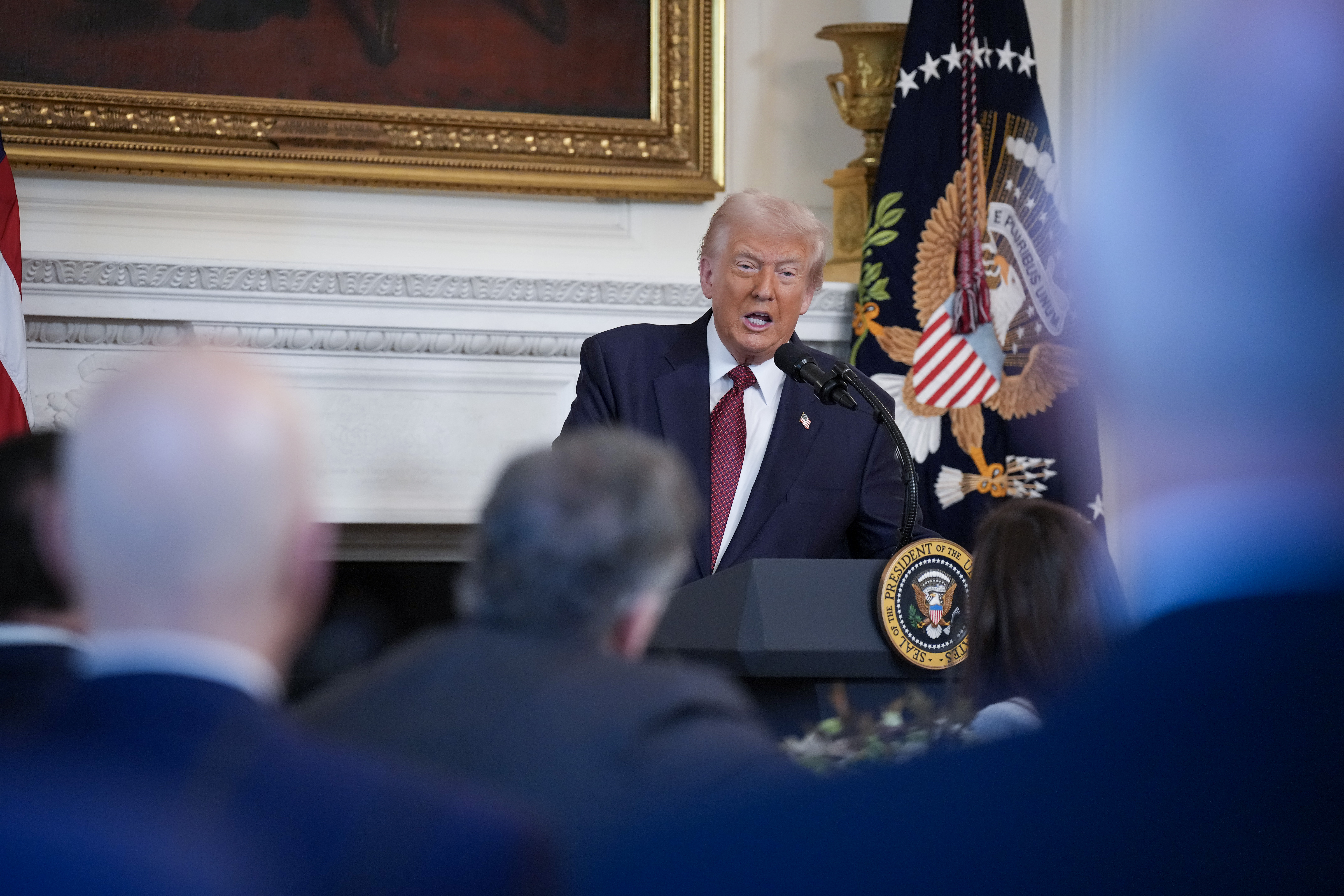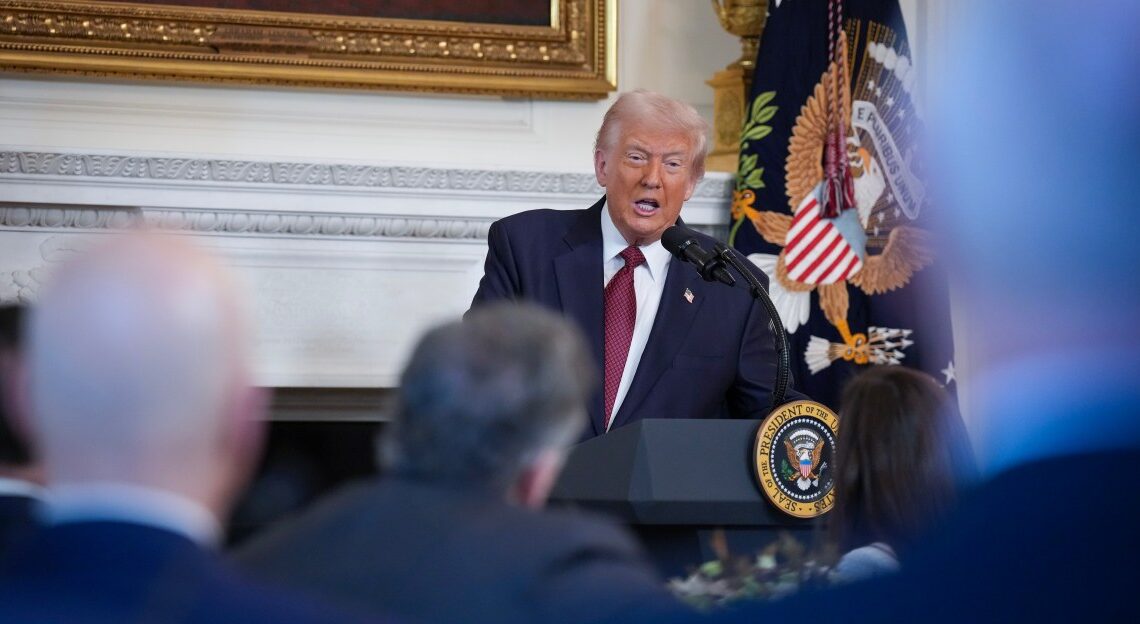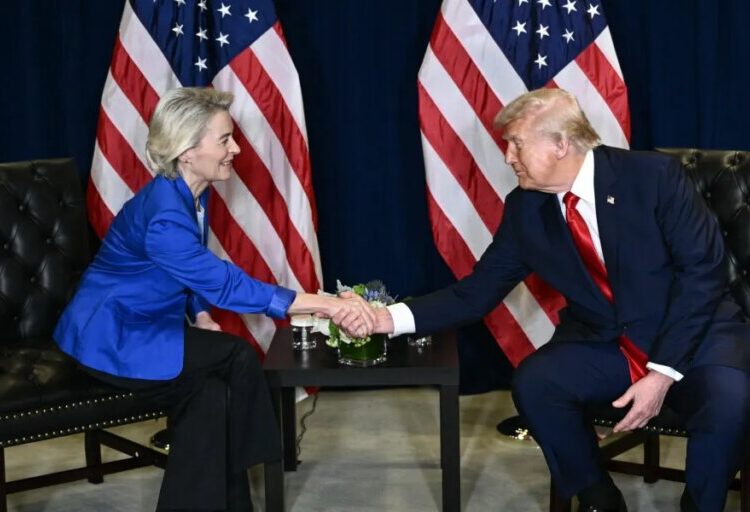
This story originally appeared in Kids Today, Vox’s newsletter about kids, for everyone. Sign up here for future editions.
What does the president do?
Kids might learn the answer to that question in school, but they also learn it from life — from eavesdropping on grown-ups, from snatches of news on TV or TikTok, from arguments on the playground or on the bus. The people who serve as president during one’s childhood necessarily shape one’s view of the office; my early conception of American political parties, for example, came largely from Presidents George H.W. Bush and Bill Clinton. And now multiple generations of young people are forming their understanding of the US presidency based on Donald Trump’s tenure.
Trump has been either serving as president or seeking the presidency for a decade at this point, and he has approached the job, shall we say, differently than his predecessors. From assuming control over congressionally appropriated funding to posting a video of himself bombing protesters with poop to demolishing the East Wing of the White House, Trump’s actions in office have upended previous ideas about what constitutes presidential behavior.
To find out how, if at all, Trump’s break-stuff approach to the presidency has affected young people’s ideas of who the president is and how a head of state should act, I reached out to teachers, students, and experts around the country. What I learned is that while kids don’t always understand the Hatch Act or the separation of powers, they do care what the president does. The actions of the person in the Oval Office influence the future that young people want to see, both for themselves and for the country.
There’s some evidence that Trump’s consolidation of power is affecting how kids and teens growing up right now see the role of the president, with potentially disturbing consequences for the future of checks and balances. At the same time, some young voters who were kids during Trump’s first term tell a different story — one of a historically unpopular leader whose time in office pushed them to imagine something different.
Madalyn Probst was 10 years old when Trump was elected for the first time in 2016. Now a 20-year-old Florida college student who volunteers with the state’s Democratic Party, she told me that the most important quality a president should have is integrity. “They’re supposed to be a public servant,” she said. “I miss knowing that my president knew that.”
A lot of young voters cast their ballots for Trump in 2024, leading some to wonder if growing up during Trump 1.0 had pushed youth to the right. But experts say it’s more complicated than that (a complexity that big Democratic wins among youth in 2025 may bear out).
The polarization of politics in the Trump era has affected young people across party lines, educators and political scientists say. Now the next generation of Americans is looking for a candidate they can trust.
“Gen Z and younger voters would be interested in someone that’s actually responsive to them,” Alexandria Davis, a political science professor at Virginia Commonwealth University (and Gen Z voter) told me.
How Trump is influencing kids today
Kids start to have some conception of government as early as kindergarten, but really begin to understand politics in middle or high school, Christopher Ojeda, a political science professor at University of California Merced, told me last year. That means a big subset of Gen Z voters came of age politically during the first Trump administration. Now, many Gen Alpha voters, born between 2010 and 2024, are getting their political education during Trump 2.0.
To some degree, the current occupant of the White House is shaping what young people see as presidential — and even what they see as legal. Shari Conditt, a high school government and history teacher in Washington state, asks her students to vote every Tuesday on a question of the day. She asked them recently if federal law allows the president to deploy National Guard troops without state approval, something Trump has tried to do in Illinois.
Two federal courts have ruled that this is not legal, and the issue is currently before the Supreme Court. However, 48.5 percent of Conditt’s students voted that the move was permitted by law, while only 24.2 percent said it wasn’t. (About 27 percent were unsure.) The result suggests that Trump’s vision of the powers of the presidency is influencing teenagers, at least in Conditt’s class.
For young people, “being socialized under the Trump presidency kind of sets a new precedent that the executive can effectively do whatever they want,” Davis said.
Growing up in a time of extreme political polarization also means kids and young people may not be learning about bipartisanship. “I understood a world where Obama was the president and trying to get things passed, dealing with a lot of pushback from a Republican Congress,” Davis said.
Today, conservatives control all three branches of government. Kids and teens aren’t necessarily learning that those branches can serve as checks on one another, because all three are pretty much moving in lockstep with Trump right now.
In some cases, the polarization of the times is making kids reluctant to even talk about the president. For years, Conditt’s students — in a purple congressional district that has elected both Republican and Democratic representatives in the past — would come to class eager to talk about current events, she said. But now, she notices more reluctance. “They’re almost hesitant to talk about some things, because they don’t want to offend,” Conditt said.
How young voters see the presidency
College students may have a deeper sense than younger kids and teens that Trump’s presidency, in particular, is abnormal. Among undergraduates Davis teaches at VCU, “there is an understanding that this is not necessarily how these things are supposed to work,” she said.
“When I was really little, people would say they wanted to be president like Barack Obama,” Probst told me. Now, you’re more likely to hear, “I want to be president, period,” she said. “The biggest difference is that you can’t really see the president as a role model.”
The president is “not a legislator,” Probst added. “They’re not supposed to be making laws. They’re not supposed to be using the presidency as a whim.”
At the same time, a lot of young people are disillusioned with politics as a whole — not just with Trump. Gen Z voters “largely feel like both parties are not really fighting for them at all,” Davis said. “There is a sense of political alienation that younger voters, but specifically younger voters of color, feel about the political system.”
Any future presidential candidate would need to cut through that sense of alienation in order to win their votes. A lot of Gen Z voters are struggling with very basic economic concerns, Davis said: “Will I be able to get a job and be successful in my life? Will I be able to raise a family?”
They want to see a candidate who can relate to those fears, which might mean someone younger than today’s political leaders, who simply haven’t faced the same level of economic and global uncertainty as Gen Z.
Among Davis’s students, Zohran Mamdani comes up a lot as the kind of candidate they’d like to see in the future. To them, his campaign “always felt close to community. It felt genuine, it felt authentic,” Davis said. “That’s not something that they have seen in previous candidates.”
Indeed, 78 percent of 18- to 29-year-old voters supported Mamdani on Tuesday night, according to exit polls, with younger voters helping to drive high turnout. Young voters, especially women, helped propel Democrats to victory across the country.
Trump’s gains with Gen Z in 2024, coupled with high-profile examples of young political operatives espousing virulent racism and antisemitism, have led some to wonder if growing up under Trump’s first presidency had pushed a generation toward the radical right. But a more complex story is also emerging, one of young people worried for their futures and frustrated with the political process, but potentially eager for something different.
In a spring 2025 Harvard Youth Poll, for example, just 15 percent of Americans under 30 said the country was heading in the right direction, and under a third approved of Trump or either party in Congress. Concerns about the economy pushed many Gen Z voters to support Trump last year, Davis said, but she’s seeing that support change as fears over civil rights come to the fore. “Those things that were being considered in 2024 have kind of shifted,” Davis said.
Probst, for her part, would like to see someone like Gov. Andy Beshear of Kentucky run for president. “I think we need to, as a whole, refocus on building the working class back up and lessening wage inequality in the United States,” she said.
Whoever the next president is, however, Probst maintains an idea of what a president should be that is, in some ways, defined in opposition to Trump. “I don’t want them making erratic claims or attempting to alienate groups of people using their personal social media,” she said. “You’re a figurehead, and you’re supposed to represent all Americans, not just those who are convenient to you.”
What I’m reading
Children in the Chicago area are being traumatized by ICE patrols and use of tear gas as part of the Trump administration’s “Operation Midway Blitz,” teachers and families say. One mother heard her child tell her dolls, “We have to be good or ICE will get us.”
Dozens of Head Start centers, including all centers in Little Rock, Arkansas, have closed thanks to a lack of federal funding during the government shutdown. That means thousands of kids could be missing out on the education, meals, and therapies the centers provide.
American children have long used words like “satnav” and “petrol” thanks to Peppa Pig. Now, more British kids are apparently using Americanisms after watching Netflix and YouTube. Examples include “apartment” and “diaper.”
My older kid is now revisiting old favorite Eerie Elementary, reading independently this time. We are also excited for Broken, the new picture book by X. Fang, who wrote the perfect We Are Definitely Human.
From my inbox
Last month, I wrote about families getting landline phones for their kids. Reader Kate Ellen wrote from Wales to express surprise “because phone companies here are closing down landlines for private customers. We lost ours last year.” Without reliable cell phone service in the countryside, Kate Ellen has taught her kids to use the phone at a nearby nursing home if there’s ever an emergency. “It may be because of my generation,” she wrote, “but even if our signal was better, I don’t like this change, and I don’t feel comfortable not having the landline.”
Thanks to Kate Ellen, and a reminder that if you want to share questions or stories, or suggest topics for a future newsletter, you can reach me at [email protected].
The post They’re growing up in the Trump era. Here’s what they want from the next president. appeared first on Vox.




